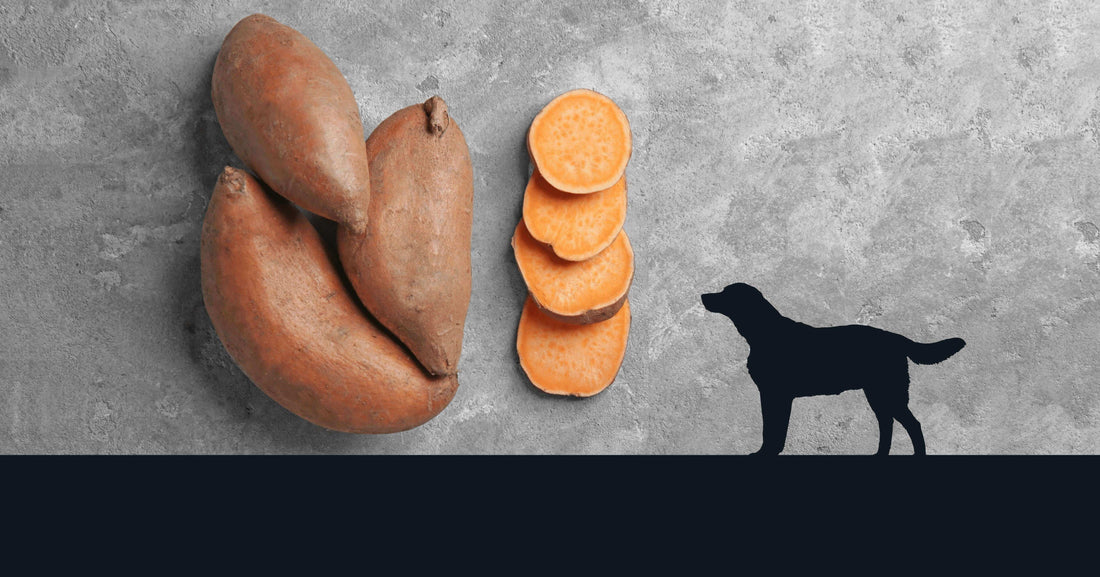
The Benefits of Sweet Potatoes for Dogs
You’ve heard of sweet potato fries, mashed sweet potatoes, and even sweet potato pie!
On a quest to lead healthier lives, many people are replacing white potatoes with their vibrant counterpart, sweet potatoes (hold the Thanksgiving brown sugar and marshmallow edition).
But is the switch safe for all our family members?
We need to answer the most important question yet — can dogs eat sweet potatoes?
What is a Sweet Potato?
Sweet potatoes originated in the Americas in the 15th century, becoming a staple crop with the arrival of Christopher Columbus. In love with the taste, Columbus eventually brought the orange potato back to Spain, and by the 16th century they quickly dominated European gardens.
Yams Versus Sweet Potatoes
Are sweet potatoes and yams the same vegetable?
Despite the fact that the terms sweet potatoes and yams are often used interchangeably in the states, they are actually quite different from one another.
Although both are underground tuber vegetables, yams are drier and starchier than sweet potatoes and are typically only found in specialty markets. Your everyday local grocery store likely carries sweet potatoes.
While sweet potatoes have become very popular in recent years, you’re probably still more accustomed to seeing white potatoes. Sweet potatoes, however, have more fiber and Vitamins C and A than a white potato.
Can Dogs Eat Sweet Potatoes?
The short answer is…yes!
Dr. Gary Richter, veterinarian and member of Rover’s Dog People panel of experts, advocates for including fresh and healthy foods like sweet potatoes into your dog’s diet. He explains, “the closer to fresh, whole food diets you feed, the healthier your dog is likely to be.”
Baked, boiled or mashed potatoes should only be given to dogs on occasion, however. It’s most common to boil, freeze, and/or dehydrate sweet potatoes for dogs. But be sure to start off with small amounts, your dog may not like the taste or they could have a sensitive stomach. If you want to mix sweet potato into their dry kibble for extra nutrition, try steaming or boiling the sweet potatoes, whichever works best for you.
Make sure to keep your dog away from the processed and fried potatoes like French fries, potato chips, potato skins, and baked potatoes piled high with flavorful and fatty toppings.
The Benefits of Sweet Potatoes for Dogs
Sweet potato is a safe, healthy, and natural treat for dogs, offering a range of health benefits (and a sweet flavor they’ll likely love). For example, sweet potatoes support a healthy digestive system thanks to their high dietary fiber content. They’re also low in fat and contain essential vitamins like B6, C, and A.
Beta-Carotene
Have you ever wondered what gives sweet potatoes their yellow, gold, or orange (and sometimes even purple) coloring? It’s beta-carotene!
Beta-carotene is an antioxidant that helps reduce the risk of certain types of cancer while simultaneously providing protection against heart disease.
“Each Beta-carotene converts to two molecules of Vitamin A in your dog’s body, which is essential for your dog’s vision, bone growth, skin and reproduction,” Steve Doerr, Technical Director and Research and Development Scientist at Redbarn Pet Products said.”
Symptoms of serious Beta-carotene or Vitamin A deficiency include night blindness, poor skin quality, abnormal bone/teeth development, and abnormal reproductive development.
Fun Fact: Dogs can convert beta-carotene to Vitamin A. Cats cannot; they must directly consume preformed Vitamin A.
Rich Source of Fiber
Sweet potatoes are second on the list of top vegetables high in fiber.
One of the main reasons for adding fiber to a dog’s diet is to encourage regular, healthy bowel movements.
Sweet potatoes are also used to alleviate constipation and diarrhea, depending on the fiber type. Some diets have higher fiber content to displace calories, increase a feeling of fullness, and help a pet lose weight.
When observing your dog, If you see your pet repeatedly straining then a vet check is strongly advised.
More Health Promoting Vitamins
According to PETMD, sweet potatoes are one of the best dietary sources of vitamin A, which promotes healthy skin, coat, eyes, nerves, and muscles in dogs. Sweet potatoes are also a rich source of vitamins A, C, B6, potassium, calcium, and iron, just to name a few!
Healthier Alternative
While it is true that white potatoes are cheaper than sweet potatoes, they offer less nutritional value. Because they contain more carbohydrates, white potatoes can potentially be one of many factors to cause blood sugar problems and obesity. That said, sweet potatoes are also primarily carbohydrates so don’t go overboard and only add a limited amount to your dog’s diet.
When adding any new food to your dog’s diet, be sure to check with your vet before making the transition.
Did you know? One cup of cooked sweet potato contains approximately 5.94 grams of fiber.
Sweet Potato Nutritional Information
According to the USDA, one medium baked sweet potato with skin contains 103 calories, 2.29 grams of protein, 23.6 grams of carbohydrates, 0.27 grams of fat, 3.8 grams of fiber and 7.39 grams of sugar.
A medium baked white potato with skin, on the other hand, contains 115 calories, 2.49 grams of protein, 0.06 grams of fat, 26.71 grams of carbohydrates, 4.6 grams of fiber, and 0.81 grams of sugar. Sweet potatoes are also rich in vitamins C and B, as well as potassium.
Sweet potatoes are mainly composed of carbs.
“Most of the carbs come from starch, but sweet potatoes also contain a decent amount of fiber,” Steve said. “A medium-sized sweet potato (boiled, without any skin) contains 27 grams of carbs.”
You can find more nutrition information on the official USDA.GOV website.
How Do I Give My Dog Sweet Potato?
The best and easiest way to treat your dog to sweet potatoes is to steam or boil them— do not add any seasonings to the pieces you feed your dog. These methods help retain more nutritional value than roasting. And remember, start by giving your dog a small amount.
“Depending on the size of your dog, start with between a teaspoon and a tablespoon,” Steve Doerr said. “Pet owners should consult a veterinarian before feeding sweet potatoes to dogs, as too much vitamin A can cause bone problems and muscle weakness, and a sudden increase in fiber could create gastrointestinal issues, so start slow!”
For a safe and easy way to include sweet potato as part of a complete meal, try Redbarn's Grain-Free Land Recipe or Grain-Free Sky Recipe Dry Dog Foods.
*All data and information provided on this site is for informational purposes only and reflect the views of the authors alone, and do not necessarily reflect those of the organization. Redbarninc.com makes no representations as to accuracy, completeness, timeliness, suitability, or validity of any information on this site and will not be liable for any errors, omissions, or delays in this information or any losses, injuries, or damages arising from its display or use. All information is provided on an as-is basis. Please note that each situation is different, and you should always consult your veterinarian should you have any questions about your pet’s health.


